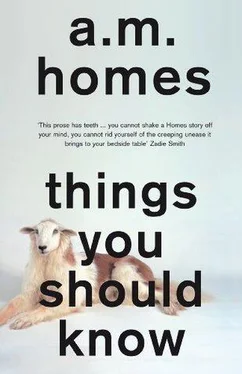Later, she passes Wendy’s desk; Wendy is obsessively dipping cookies into a container of orange juice.
“Are you okay?”
Wendy puts out her hands, they’re shaking. “Low blood sugar. I spent from eight-thirty until three trying to get the damned computer to print. I called Information Services, they said they could come tomorrow, but the proposal had to go out today. Never mind. I did it. I got it done.” She plunges a cookie into the juice.
She hands Wendy a sample of the remedy. “Try it,” she says. “Call it market research and bill them for an extra twenty-five hundred bucks.”
Again she dials. The phone rings and rings, maybe her mother is there, maybe she is on the other line. Maybe it is her father — her father always ignores the call-waiting, he doesn’t know what call-waiting is.
“Didn’t you hear me beeping? That was me trying to call you.”
“Is that what that was? I was on the line, talking to a man about something.”
She worries that one day she will call and no one will answer — one day she will call and they won’t be there anymore.
She remembers dialing her grandmother’s number just after her grandmother died. She called just as she had always done. The number rang and rang and somehow she didn’t lose hope that her grandmother would find her way to the phone. She thought it might take longer, but she expected her grandmother would answer. And then one day there was a recorded voice, “The number you are trying to reach has been disconnected. If you need further assistance please hang up and dial the operator.”
She hangs up. Six months after her grandmother died, she went to her grandmother’s house and parked outside the front door. The plants that used to be on the sill of the kitchen window were gone. The light in the living room, always on, was off. She walked around back and peered through the sliding glass door. The house was filled with different furniture; different pictures of different grandchildren rested on the mantel.
“Can I help you?” Mr. Silver, the old man next door asked, as though he’d never seen her before.
“Just looking,” she said and walked away.
It is getting dark: five-twenty-two. If she hurried she could take the six o’clock Metroliner, she could be in Washington by eight. She wants to go home. It has been coming upon her for days. Almost like coming down with a cold, she has been coming down with the urgent need to go home, to sit at her place at the kitchen table, to look out her bedroom window at the trees she saw at one, at twelve, at twenty. She needs something, she can’t say exactly what. She keeps brushing it off, hoping it will pass, and then it overwhelms her.
Again, she dials. A man answers. She hangs up and tries again, more carefully, looking at the numbers. Again, the unfamiliar man answers.
“Sorry,” she says. “Wrong number.”
Again, she tries again.
“May I help you?” he says.
“I keep thinking I’m calling home, I know this number, and yet you answer. Sorry. I’ll check the number and try again.”
She dials.
“Hello?” the man says. “Hello, hello?”
She says nothing.
He waits and then hangs up.
She puts on her coat and leaves the office. If she had reached her mother she might have felt good enough to go to the gym or to go shopping. But what started as a nervous tic has become something more, she is all the more uncomfortable, she goes directly to the apartment.
There is a message from Steve.
“Sorry we didn’t talk. I meant to call earlier but things got crazy. Tonight’s the game. I’ll be home late.”
The game. She forgot.
She takes off her coat and pours herself a glass of wine.
Steve is at the game with his best friend, Bill. Bill is forty-three, never married. Bill won’t keep anything perishable in his apartment and has no plants because it’s too much responsibility. When he’s bored he drones “Next,” demanding a change of subject. Inexplicably, it is Bill whom Steve turns to for advice.
Again, she dials.
“Who are you trying to reach?” the man asks. This time, no hello.
Without saying anything, she hangs up.
She orders Chinese. She calls her brother in California; she gets his machine. “When did you last talk to Mom and Dad? Were they okay? Did something happen to their phone? Call me.”
By ten, she is beginning to imagine horrible things, accidents. She is dialing and dialing. Where are they? At seventy-six and eighty-three, how far can they have gotten?
She remembers New Year’s Eves when she was young, when she was home eating Ruffles with Ridges and California Dip, watching New Year’s Rockin’ Eve and waiting.
Eleven-fifty-nine, the countdown, sixty seconds away from a new year; three, two, one. The ball drops. The crowd goes crazy.
“Happy New Year from Times Square in New York. Look and listen as America welcomes in 1973.” She drinks her fizzy cider and waits. Ten minutes later the phone rings.
“Happy New Year, sweetie,” her mother says. “We’re having a wonderful time. Mrs. Griswald is just about to serve dessert and then we’ll be home. It’s going to be a good year.”
She remembers checking the clock — twelve-twenty. At one, New Year’s Rockin’ Eve segued into the late, late movie and she began to wonder. At one-thirty wonder turned to worry. At quarter of two she was picturing her parents’ car in a ditch by the side of the road. At two-twenty she wondered if it was too late to call the Griswalds and ask when they’d left. She was twelve years old and powerless. By two-forty, when she heard their key in the door, she was livid. She slammed the door to her room and turned off the light.
“Honey, are you all right?”
“Leave me alone.”
“I hope she didn’t get into the liquor — should I check?”
“I hate you.”
Happy New Year.
She gives it one last go — if they don’t answer, she is going to call Mrs. Lasky, one of the neighbors, and ask if things are as odd as they seem.
Her mother answers on the first ring.
“Where were you?” she blurts.
“I was in the closet, looking for something.”
“I’ve been trying to call you for hours, why do you sound so strange?”
“Strange?”
“Breathless.”
“I was in the closet — foraging. What do you mean you’ve been calling for hours, we just got home. We had concert tickets.”
“I didn’t know where you were. I was worried.”
“We’re adults, Susan. We’re allowed to go out.” She pauses. “What day is it?”
“Wednesday.”
“You usually call on Sunday.”
“I was thinking of coming home.”
“When?”
“This weekend.”
“Well, I don’t know what our schedule is like. I’ll have to check. What’s new?” her mother asks, changing the subject.
“Not much. I must have dialed your number a hundred times — first I couldn’t get through, then I got the machine, and the last few times some man answered. I was beginning to feel like I was losing my mind.”
“That must have been Ray.”
“Ray?”
“A friend of your father’s.”
“Daddy doesn’t have any friends.”
“This is someone he met at one of his classes — I think he’s lonely, he brought his cat. It’s good you’re not here.” She is allergic to cats.
“I thought it was me, I thought I dialed wrong. Why didn’t he identify himself? Why didn’t he say, Green residence? Why didn’t he just say — I’m the one who’s out of place?”
“I don’t know,” her mother says.
“Did Daddy go with you to the concert?”
“Of course — he drove.”
“What was this Ray doing at the house when you weren’t home?”
Читать дальше












